Understand the Purpose of a France Visa Cover Letter
Navigating the France visa application process can feel daunting, but understanding each component significantly increases your chances of success. A crucial part of your application is the cover letter, a document that serves as your personal introduction to the visa officer. This guide will walk you through the intricacies of crafting a compelling cover letter, ensuring your application stands out. A well-written cover letter is not merely a formality; it’s your opportunity to present your case clearly and persuasively. It provides context, elaborates on your intentions, and supports the documents you submit. Remember that the visa officer reviews hundreds of applications, so a well-structured and detailed cover letter can be the key to a favorable decision. This letter provides a personalized touch and can often make the difference between acceptance and rejection.
What is a Cover Letter and Why Do You Need One?
A cover letter, in the context of a France visa application, is a formal letter you write to the French consulate or embassy. It introduces you, the applicant, and provides vital information about your trip. It outlines your travel plans, explains the purpose of your visit, and highlights why you should be granted a visa. Essentially, it’s your chance to make a strong first impression and convince the visa officer that you are a genuine traveler who intends to return to your home country after your visit. The letter also acts as a roadmap, guiding the visa officer through your application and making it easier to understand all the accompanying documents. Including a detailed cover letter is almost always required. Failure to provide a cover letter, or submitting one that is poorly written, can lead to delays or denial of your visa application.
Importance of a Well-Written Cover Letter for Visa Approval
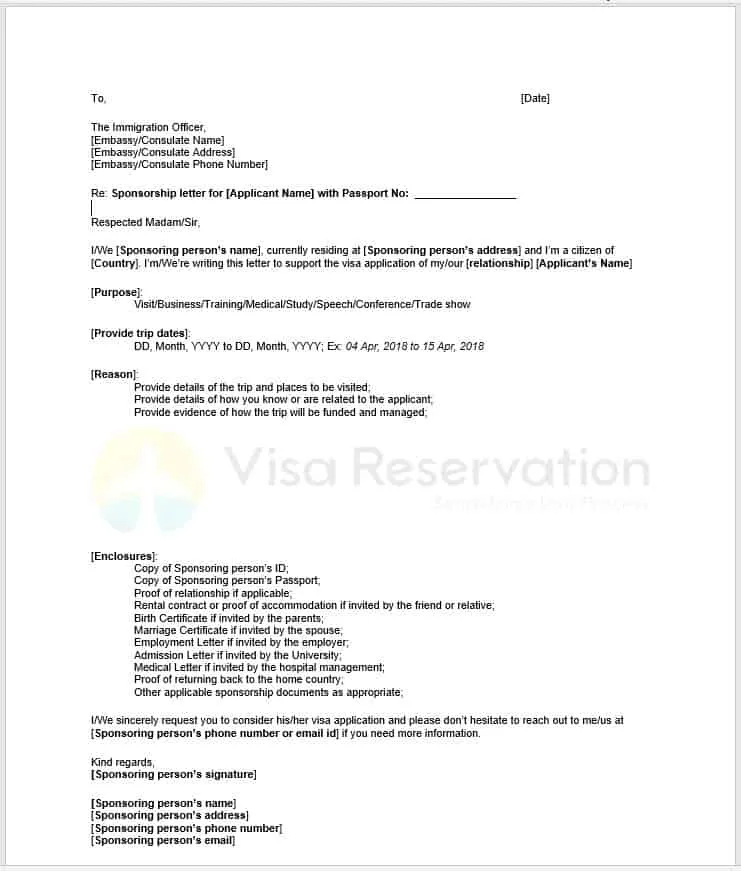
The quality of your cover letter can significantly impact your visa approval. A well-written letter provides clarity, addresses potential concerns, and demonstrates your trustworthiness. It should concisely explain your travel purpose and your ties to your home country, which reduces the risk of you overstaying your visa. A well-structured letter will make it easier for the visa officer to understand your application. A poorly written cover letter, on the other hand, might contain errors, lack essential information, and raise suspicion. It’s essential to treat this document with the seriousness it deserves. Take the time to carefully craft your letter, proofread it thoroughly, and ensure it paints a clear and positive picture of your travel plans. Your cover letter is a critical piece of the puzzle; it can significantly improve the outcome of your visa application.
Key Components of a France Visa Cover Letter
Applicant’s Personal Information
The opening section of your cover letter should clearly state your personal details. This provides a straightforward introduction and enables the visa officer to quickly identify you. Accurate and complete information here is very important.
Full Name, Date of Birth, and Nationality
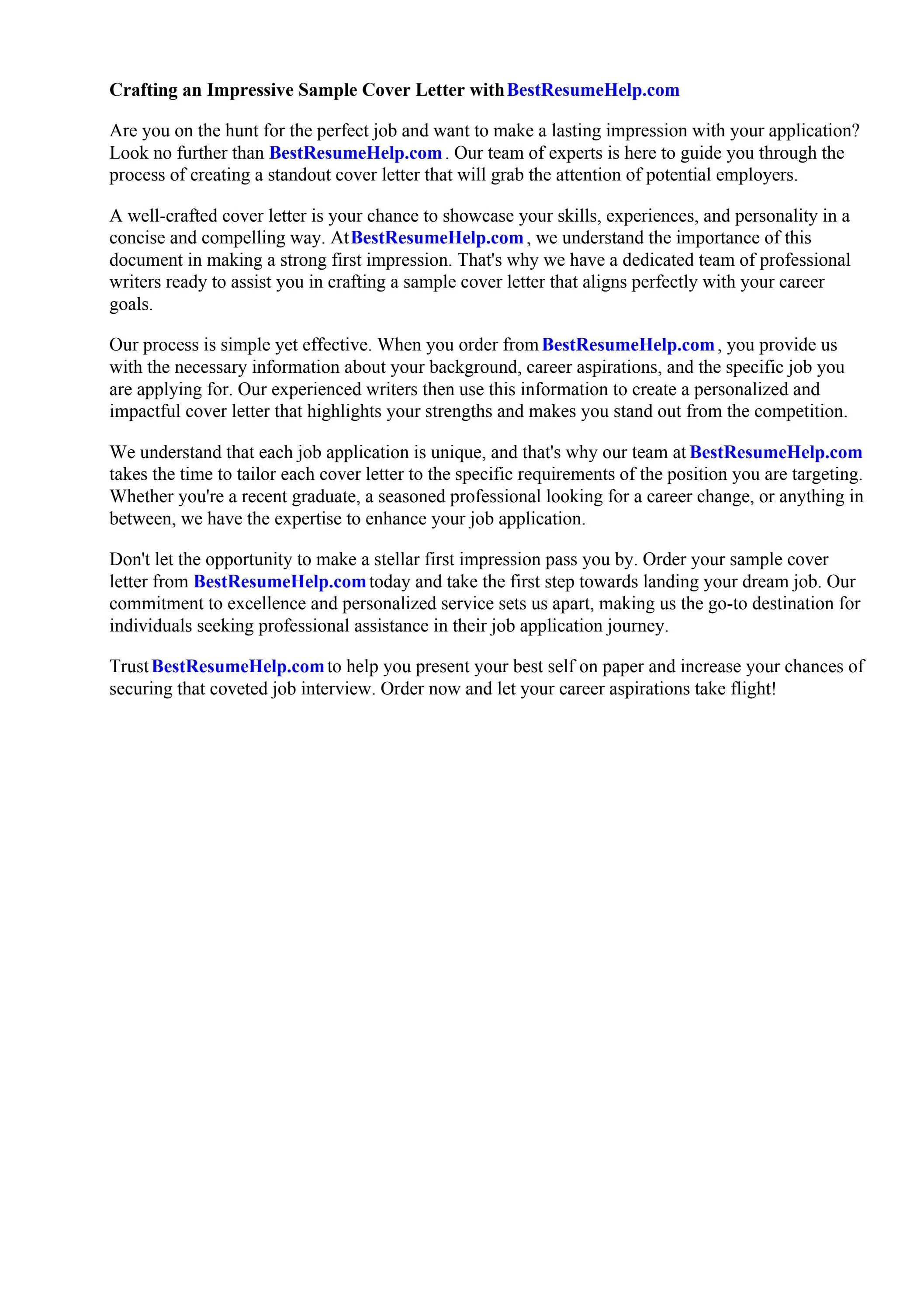
Begin by stating your full legal name, as it appears on your passport. Include your date of birth (day, month, year) and your nationality. These details are essential for the visa officer to verify your identity and ensure that your application is correctly associated with you. Make sure this matches your passport information exactly; any discrepancy could cause confusion or raise questions. For example: “My name is [Your Full Name], born on [Date of Birth], a citizen of [Nationality].”
Passport Details
Provide your passport number, the date of issue, and the expiry date. This information links your application to your official travel document. Also, mention the place of issuance of your passport. It’s crucial to ensure this information is accurate to prevent any delays or issues. Include these details after your personal information for easy reference. For example: “My passport number is [Passport Number], issued on [Date of Issue] and expiring on [Date of Expiry], issued by [Issuing Authority].”
Purpose of Visit and Detailed Itinerary
Clearly state the purpose of your visit to France. This could be tourism, business, study, or any other valid reason. Be specific, as this helps the visa officer understand the nature of your trip. Providing a detailed itinerary is crucial. It should list the dates of your travel, the places you intend to visit, and the activities you plan to undertake. A well-structured itinerary will show the visa officer that you have planned your trip thoroughly and have a clear understanding of your activities while in France. Including this information demonstrates that you have a legitimate reason for your visit and that you are organized.
Specifics about the Trip
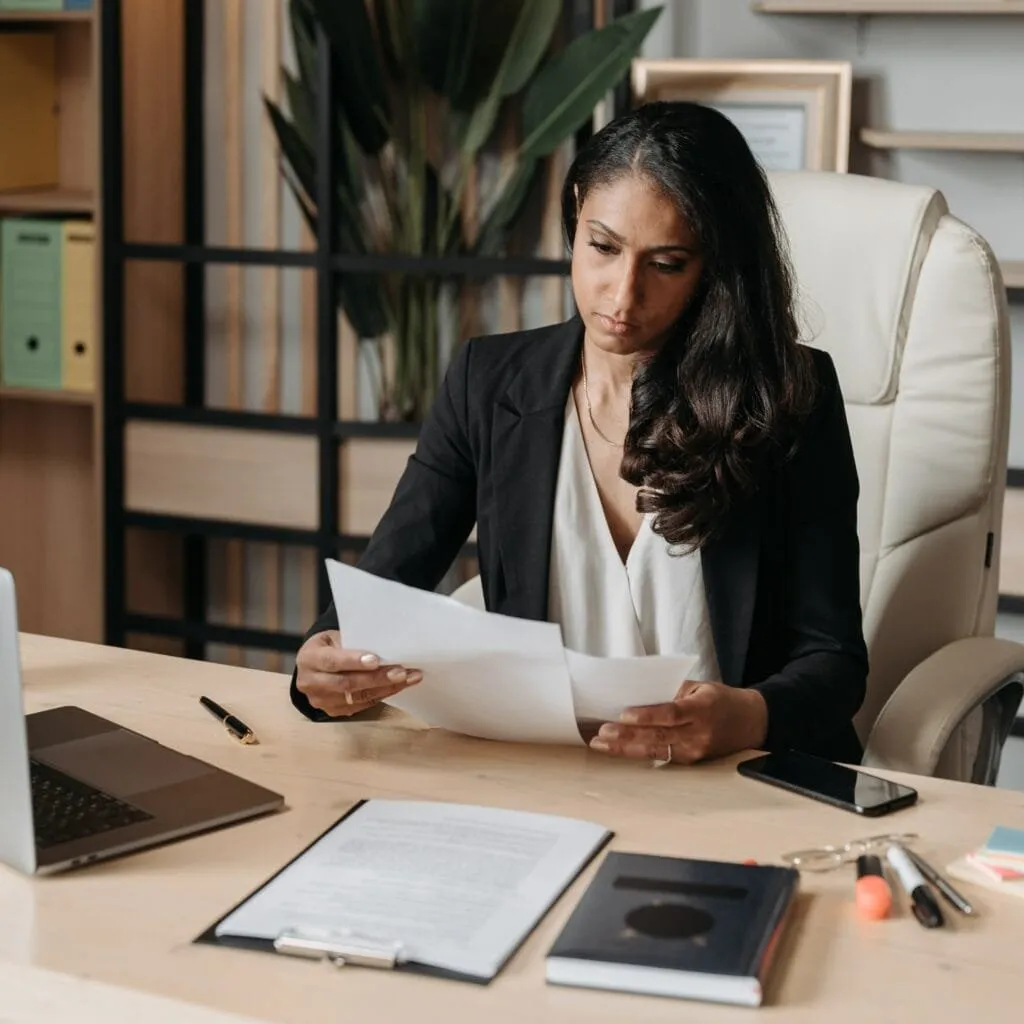
Incorporate specifics such as the precise dates of your arrival and departure. Also, list the cities and towns you plan to visit, along with any scheduled activities. If you are visiting specific attractions, mention them. Including the names of hotels or accommodations where you will be staying is also important. Being as detailed as possible conveys your commitment to your itinerary and provides the visa officer with a solid understanding of your plans. For example: “I plan to arrive in Paris on [Date] and depart on [Date]. I will be visiting [Specific places] and staying at [Hotel Name].”
Accommodation Details
Include complete information regarding your accommodation. Provide the full name and address of the hotel or other lodging where you’ll be staying. If you are staying with friends or family, include their full name, address, and relationship to you. This demonstrates that you have secured a place to stay during your trip and have a plan. Providing this shows the visa officer that you have carefully considered the logistics of your trip and have a clear plan for your stay. Ensure this information matches the details provided in your hotel or accommodation booking. For example: “I will be staying at [Hotel Name and Address] during my stay.”
Financial Stability and Proof of Funds
Demonstrating your financial stability is a very important step in the visa application process. You need to show that you have enough funds to cover your travel expenses, including accommodation, food, activities, and return travel. This assures the visa officer that you can support yourself during your stay in France and that you are not likely to overstay or become a burden on the French government. The required funds can be indicated by providing bank statements, proof of employment, or sponsorship letters. The amount of funds required varies depending on the length of your stay and your personal circumstances.
Bank Statements and Other Financial Documents
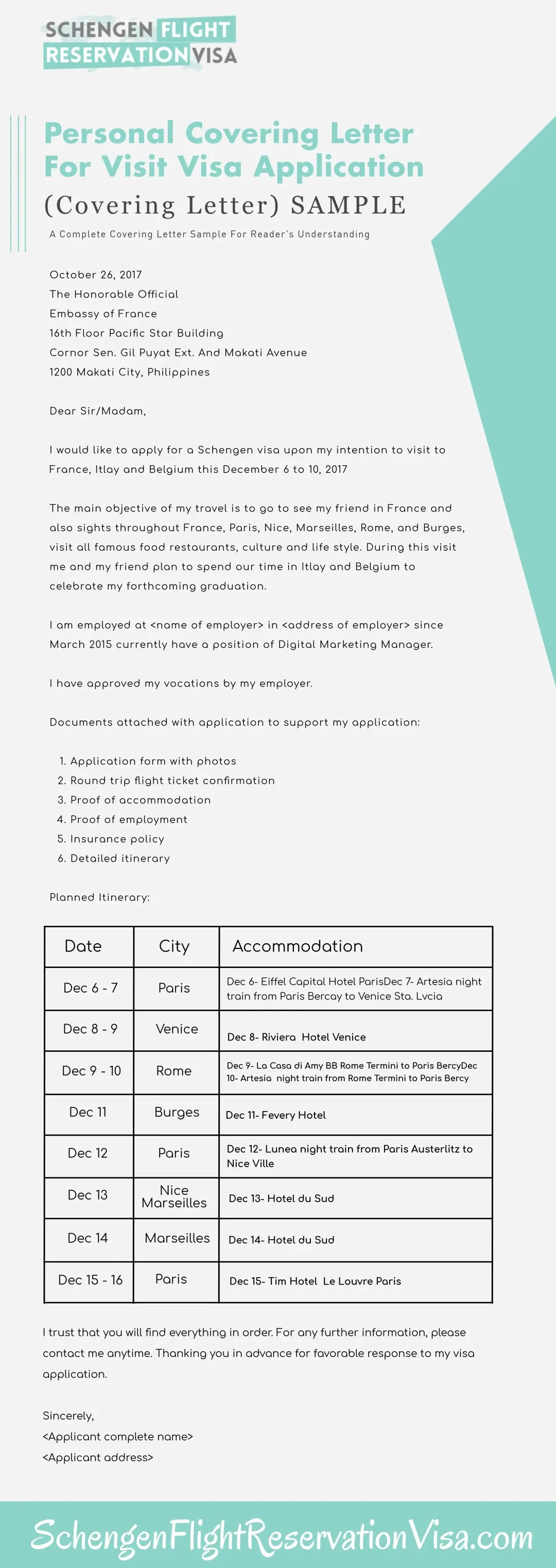
Provide recent bank statements showing sufficient funds to cover your trip. Bank statements should include your name, account number, the bank’s name, and transaction history. You should also include any other financial documents such as proof of investments, property ownership, or any other source of income that supports your financial capability. These documents provide tangible proof of your financial stability. The more evidence you provide, the better. It is very important to ensure that your bank statements are up-to-date and reflect recent transactions. For example: “I have attached my bank statements from [Bank Name] for the past [Number] months, showing sufficient funds to cover my travel expenses.”
Employment or Student Status
Include your employment or student status in your cover letter. This helps to establish your ties to your home country, which is a critical factor in determining your likelihood of returning after your visit. Clearly state your current employment or student status, including your job title, company name, or educational institution. Provide details about your employment or education to confirm your connection to your home country. For example, a letter from your employer confirming your employment and intended return, or an enrollment letter from your educational institution.
If Employed
If employed, state your job title, the name and address of your employer, and your date of employment. Include the salary you earn, and how your employment will be maintained while you are in France. Having a job to return to greatly increases your chances of visa approval. Providing this demonstrates your commitment to returning to your home country after your trip. For example: “I am employed as a [Your Job Title] at [Company Name and Address]. My salary is [Amount] per [Period]. I will return to my position after my trip to France.”
If a Student
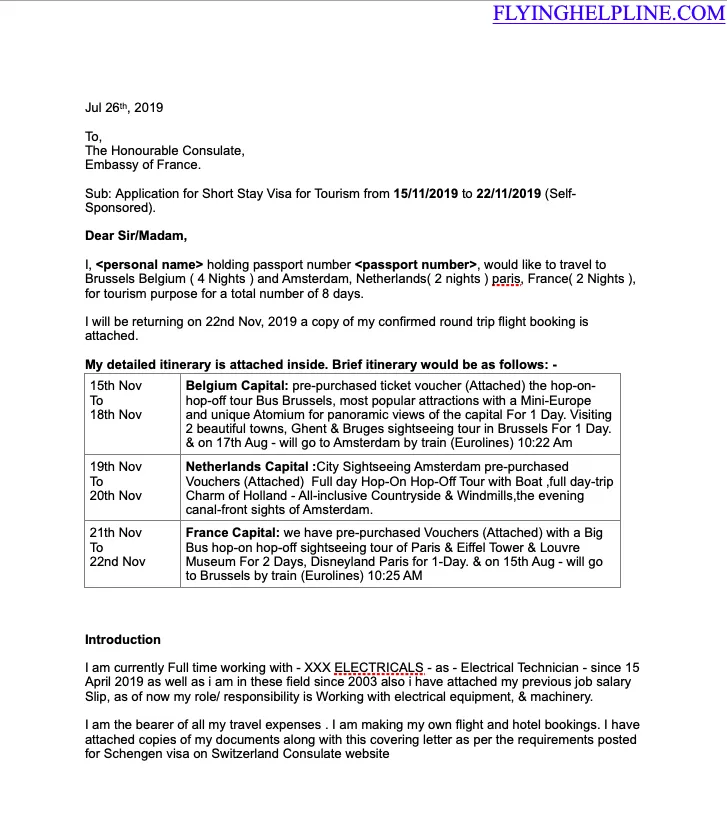
If you’re a student, state your course of study, the name and address of your educational institution, and your expected graduation date. Including this shows your commitment to completing your education and your intention to return to your studies after your trip. Also, if you are taking time off for your trip, include the dates of your leave and confirmation that you will be resuming your studies upon your return. For example: “I am a student at [Educational Institution] studying [Course of Study]. I am expected to graduate in [Year]. I will be returning to my studies after my trip.”
Supporting Documents and Attachments
A cover letter is most effective when it is supported by other documentation. The supporting documents confirm and elaborate on the information presented in the cover letter. These documents provide tangible evidence of your claims and strengthen your application. By carefully organizing and including all required supporting documents, you can ensure your application is comprehensive and credible.
List and Organize Supporting Documents
Create a list of all supporting documents you are including with your application. This list acts as a checklist for both you and the visa officer. Organize the supporting documents systematically. For example, you can group them by category, such as personal identification, financial documents, travel itinerary, and employment/student status. It is beneficial to label each document clearly so the visa officer can easily identify and verify each piece of information. Include copies of your passport, flight tickets, and hotel bookings. Organize all supporting documents logically to provide a clear and well-organized application. This helps the visa officer review your application efficiently and improves your chances of approval.
Formatting and Presentation Tips
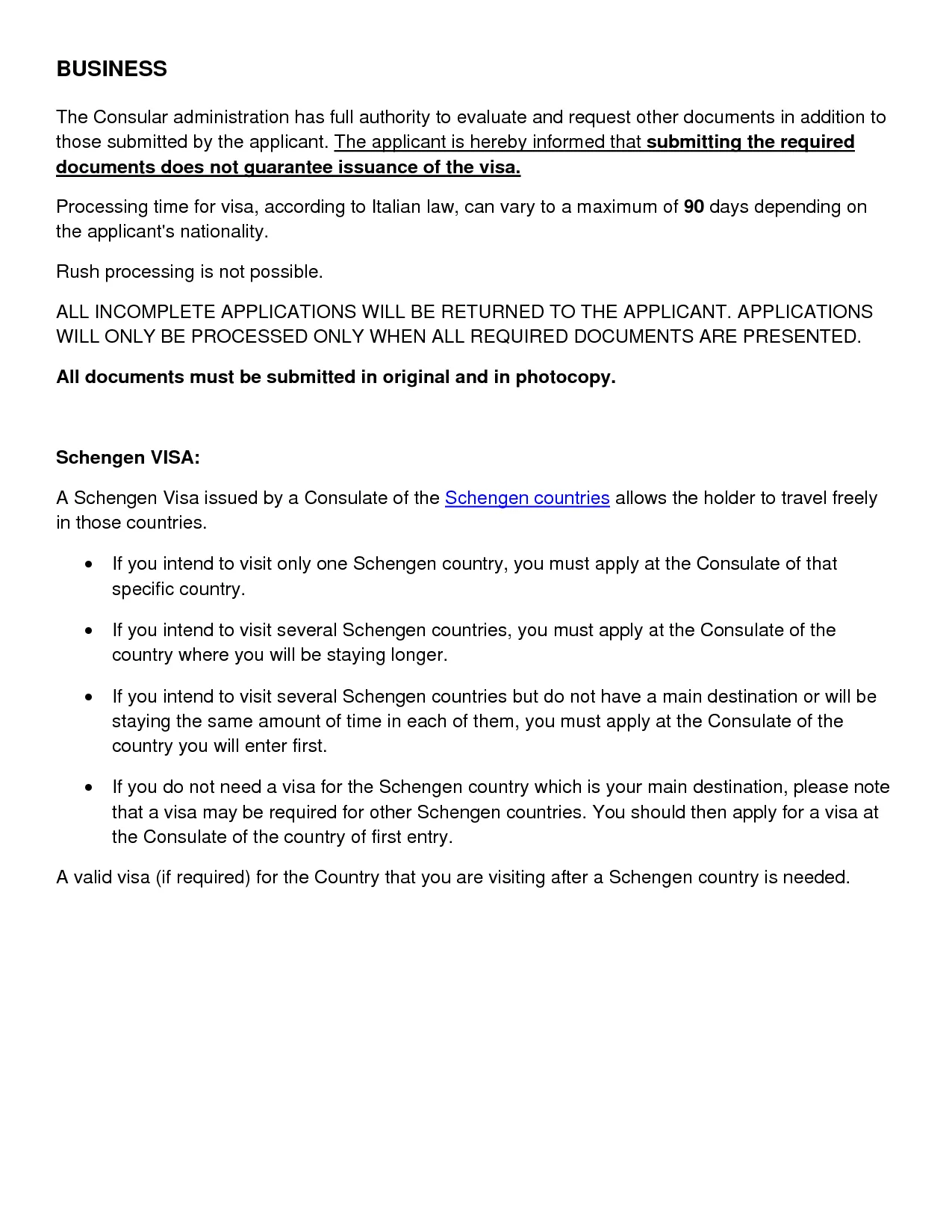
The presentation of your cover letter is important. It should be neat, professional, and easy to read. It makes a strong impression and shows that you are thorough and organized. Using the right format, language, and tone contributes to the overall impact of your letter. A well-formatted and carefully written letter helps to increase your chances of visa approval.
Proper Formatting Guidelines
Use a standard business letter format. Include your name and address at the top, followed by the date. Then, add the name and address of the French embassy or consulate where you are applying. Ensure your letter has clear margins and a readable font, such as Times New Roman or Arial, with a font size of 12 points. Make sure your letter is properly structured, with clear paragraphs, headings, and subheadings to make the information easily accessible. Keep it concise and to the point, using short, clear sentences. A well-formatted letter will present you professionally and help the visa officer quickly understand the key information.
Tone and Language Style
Maintain a professional and polite tone throughout your cover letter. Use formal language and avoid slang or colloquialisms. Be honest, transparent, and truthful in your statements. The tone should convey respect for the visa process and the French authorities. Ensure your letter is grammatically correct, well-written, and free of errors. Proofread carefully for any spelling or grammatical mistakes. Using correct language creates a positive impression and demonstrates your seriousness and attention to detail.
Review and Proofreading
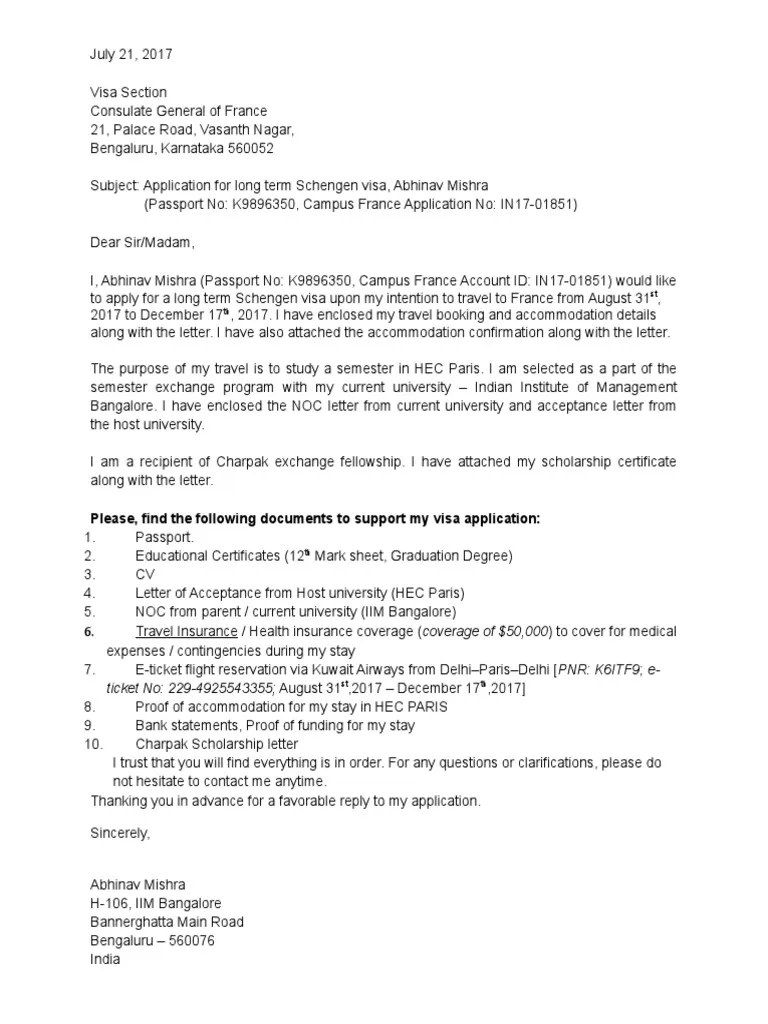
Thoroughly review and proofread your cover letter before submitting it. This is a very important step. Check for any spelling, grammatical, and punctuation errors. Verify that all information is accurate and consistent with the supporting documents. Ask a friend, family member, or a professional to review your letter. Having a second set of eyes can help identify mistakes that you may have missed. Ensuring your cover letter is error-free shows your attention to detail and gives the visa officer confidence in the rest of your application. Taking this extra step can significantly improve your chances of visa approval.
Common Mistakes to Avoid
Be aware of common mistakes to avoid when writing your France visa cover letter. Avoiding these errors improves your chances of visa approval. By being careful about these points, you can significantly improve the quality of your application and increase your chances of a successful outcome. Recognizing and avoiding these pitfalls will help you make your cover letter more effective and persuasive.
Inaccurate Information
Avoid providing any false or misleading information in your cover letter. This includes details about your travel dates, purpose of visit, and financial status. It is also important to ensure that the information you provide is consistent with the documents you are submitting. For example, dates of travel should match the flight tickets and hotel bookings. Making false statements will cause serious problems. Doing so could lead to the denial of your visa and potentially affect your ability to obtain a visa in the future. Be truthful and accurate in all aspects of your application.
Lack of Clarity
Ensure your cover letter is very clear and concise. Avoid using overly complex language or vague statements that could cause confusion. Always make sure that the purpose of your trip and your itinerary are easily understood. Provide specific details and avoid generalities. When possible, use simple and direct language to present the information. A lack of clarity can make it difficult for the visa officer to understand your plans and intentions. Ensure that the main points are easy to understand and that there is no ambiguity in your statements.
Missing Documents
Do not submit an incomplete application. Make sure that you are attaching all the necessary supporting documents as requested by the French consulate or embassy. Ensure that all required information is provided and that all the requested documents are included. Make a checklist to ensure you have gathered and attached all necessary documents. A missing document could lead to your application being delayed or rejected. Always carefully review the requirements and make sure that your application is complete before submission. Always be sure you have the right amount of financial proof.
Tips for a Successful Visa Application
Beyond your cover letter, other actions will help you with your visa application. Ensuring that your application is complete, accurate, and truthful is essential. Submitting your application well in advance of your planned travel date is advisable to allow sufficient processing time. Remember to carefully follow all the instructions provided by the French embassy or consulate. By following these tips and paying attention to the details, you can greatly increase your chances of a successful visa application and make your journey to France much easier.
